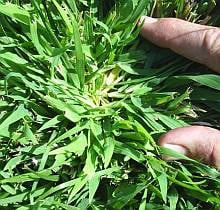Is Organic Weed Control Possible?

In today’s marketplace, there seems to be a “natural” or “organic” alternative for every product, and herbicides are no exception. Environmental friendliness is a concern for all of us, which is why at Green Lawn Fertilizing we implement “Integrated Pest Management”, or in short, using only the proper amount of product, strategically timed and placed, to eliminate the target weed. Many consumers, however, still feel that it is necessary to use an organic weed control to minimize their environmental impact. Unfortunately, there is an abundance of inaccurate and conflicting information regarding the effectiveness of this option. Listed below are some of the most common industry misconceptions regarding organic weed control:
- Organic weed control is just as effective. In most cases, particularly for residential use, herbicides such as those used by Green Lawn Fertilizing are far more effective than the organic alternative. Home remedies such as hot water, salt, vinegar, citrus, etc., may work on a small range of annual weeds to a limited degree, but they will not be effective for perennial weeds or many of the harder to control weeds you will encounter in your lawn, specifically ground ivy or crabgrass. These natural weed control methods work as a contact killer, meaning that they damage the leaf of the weed and “brown it out”, but there is no systemic element to this type of control, which means the root systems remain undamaged and the weed will recover and regrow.
- Organic weed controls are better for the healthy grass on my lawn. The idea that organic weed control is better for the healthy grass on the lawn is false, and in fact, in most cases the opposite is true. The residuals of the materials often used in organic weed control typically remain in the soil for a greater amount of time, radically changing the soil pH, which has a major adverse effect on the overall growing conditions.
- Organic weed controls are safer for children and pets. The safety aspect of choosing an organic weed control versus an industry regulated herbicide is one of the primary and most sensitive concerns for the average customer. The product label and MSDS (Material Safety Data Sheet) of all herbicides used at Green Lawn Fertilizing are readily available at the customer’s request. Most herbicides fall under the “Caution” or “Warning” label as issued by the EPA, which is toward the lower end of the toxicity rating scale, and is roughly in line with many cleaning products. Conversely, many of the organic options need to be applied at such a highly concentrated rate to be effective that they pose an even greater threat once applied.
- Organic weed controls are cheaper. More often than not, organic herbicides need to be applied at a greater rate and more frequently than the herbicide option, so even in the instance that an ounce by ounce comparison may show the organic product to be cheaper (which is a rarity in and of itself), the amount that will need to be used will negate any potential savings for this option, and for larger square footage properties prove to be far more expensive.
At Green Lawn Fertilizing, we employ only state certified, full time technicians to apply our herbicides. While we are confident that our products pose no threat and are actually the more environmentally sound option for weed control, we understand and respect the concerns of our customers and would be happy to answer any further questions prior to initiating a lawn care program. Feel free to call our office or email us with any further questions or concerns.